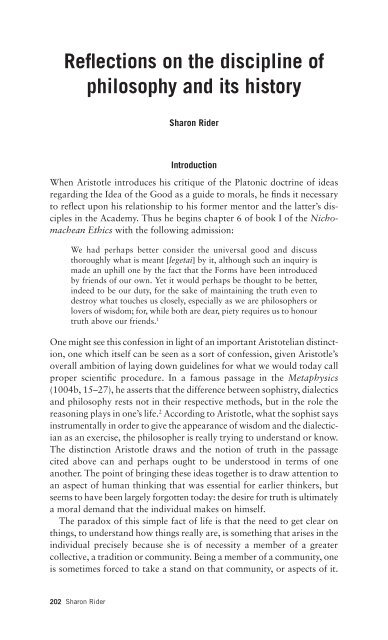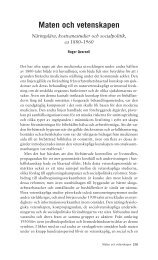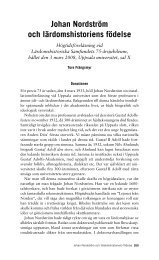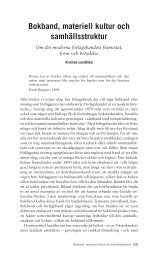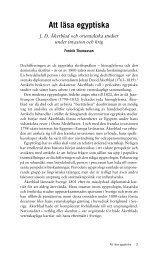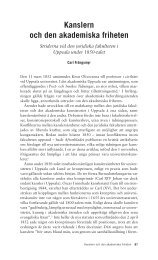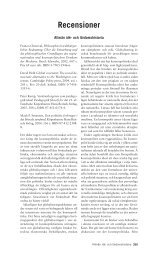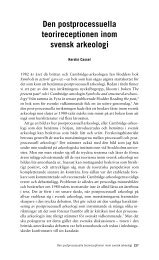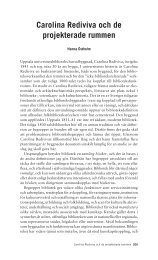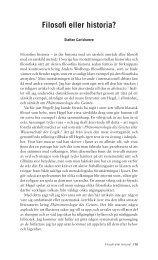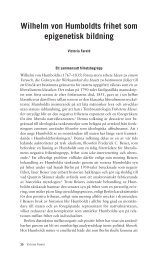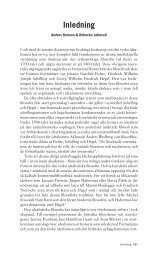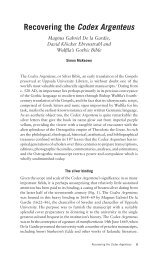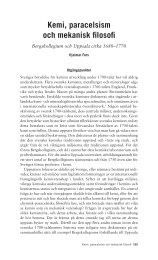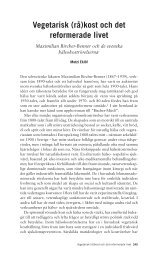Reflections on the discipline of philosophy and its history
Reflections on the discipline of philosophy and its history
Reflections on the discipline of philosophy and its history
Create successful ePaper yourself
Turn your PDF publications into a flip-book with our unique Google optimized e-Paper software.
<str<strong>on</strong>g>Reflecti<strong>on</strong>s</str<strong>on</strong>g> <strong>on</strong> <strong>the</strong> <strong>discipline</strong> <strong>of</strong><strong>philosophy</strong> <strong>and</strong> <strong>its</strong> <strong>history</strong>Shar<strong>on</strong> RiderIntroducti<strong>on</strong>When Aristotle introduces his critique <strong>of</strong> <strong>the</strong> Plat<strong>on</strong>ic doctrine <strong>of</strong> ideasregarding <strong>the</strong> Idea <strong>of</strong> <strong>the</strong> Good as a guide to morals, he finds it necessaryto reflect up<strong>on</strong> his relati<strong>on</strong>ship to his former mentor <strong>and</strong> <strong>the</strong> latter’s disciplesin <strong>the</strong> Academy. Thus he begins chapter 6 <strong>of</strong> book I <strong>of</strong> <strong>the</strong> NichomacheanEthics with <strong>the</strong> following admissi<strong>on</strong>:We had perhaps better c<strong>on</strong>sider <strong>the</strong> universal good <strong>and</strong> discussthoroughly what is meant [legetai] by it, although such an inquiry ismade an uphill <strong>on</strong>e by <strong>the</strong> fact that <strong>the</strong> Forms have been introducedby friends <strong>of</strong> our own. Yet it would perhaps be thought to be better,indeed to be our duty, for <strong>the</strong> sake <strong>of</strong> maintaining <strong>the</strong> truth even todestroy what touches us closely, especially as we are philosophers orlovers <strong>of</strong> wisdom; for, while both are dear, piety requires us to h<strong>on</strong>ourtruth above our friends. 1One might see this c<strong>on</strong>fessi<strong>on</strong> in light <strong>of</strong> an important Aristotelian distincti<strong>on</strong>,<strong>on</strong>e which <strong>its</strong>elf can be seen as a sort <strong>of</strong> c<strong>on</strong>fessi<strong>on</strong>, given Aristotle’soverall ambiti<strong>on</strong> <strong>of</strong> laying down guidelines for what we would today callproper scientific procedure. In a famous passage in <strong>the</strong> Metaphysics(1004b, 15–27), he asserts that <strong>the</strong> difference between sophistry, dialectics<strong>and</strong> <strong>philosophy</strong> rests not in <strong>the</strong>ir respective methods, but in <strong>the</strong> role <strong>the</strong>reas<strong>on</strong>ing plays in <strong>on</strong>e’s life. 2 According to Aristotle, what <strong>the</strong> sophist saysinstrumentally in order to give <strong>the</strong> appearance <strong>of</strong> wisdom <strong>and</strong> <strong>the</strong> dialecticianas an exercise, <strong>the</strong> philosopher is really trying to underst<strong>and</strong> or know.The distincti<strong>on</strong> Aristotle draws <strong>and</strong> <strong>the</strong> noti<strong>on</strong> <strong>of</strong> truth in <strong>the</strong> passagecited above can <strong>and</strong> perhaps ought to be understood in terms <strong>of</strong> <strong>on</strong>eano<strong>the</strong>r. The point <strong>of</strong> bringing <strong>the</strong>se ideas toge<strong>the</strong>r is to draw attenti<strong>on</strong> toan aspect <strong>of</strong> human thinking that was essential for earlier thinkers, butseems to have been largely forgotten today: <strong>the</strong> desire for truth is ultimatelya moral dem<strong>and</strong> that <strong>the</strong> individual makes <strong>on</strong> himself.The paradox <strong>of</strong> this simple fact <strong>of</strong> life is that <strong>the</strong> need to get clear <strong>on</strong>things, to underst<strong>and</strong> how things really are, is something that arises in <strong>the</strong>individual precisely because she is <strong>of</strong> necessity a member <strong>of</strong> a greatercollective, a traditi<strong>on</strong> or community. Being a member <strong>of</strong> a community, <strong>on</strong>eis sometimes forced to take a st<strong>and</strong> <strong>on</strong> that community, or aspects <strong>of</strong> it.202 Shar<strong>on</strong> Rider
A <strong>the</strong>oretical positi<strong>on</strong> or philosophical doctrine can c<strong>on</strong>stitute such acollective. As a prop<strong>on</strong>ent or representative <strong>of</strong> a certain viewpoint orpositi<strong>on</strong>, <strong>the</strong> individual is faced with a difficulty. The distincti<strong>on</strong> Aristotlemakes between <strong>philosophy</strong> <strong>and</strong> dialectics can be understood, in modernterms, as <strong>the</strong> difference between free thinking <strong>and</strong> thinking that is characterizedby <strong>its</strong> adaptati<strong>on</strong> <strong>of</strong>, or submissi<strong>on</strong> to, <strong>the</strong> collective st<strong>and</strong>ards,evaluati<strong>on</strong>s, methods <strong>and</strong> c<strong>on</strong>cepts <strong>of</strong> a given scientific or scholarly community.Naturally, this does not mean that in order to possess intellectualintegrity, <strong>on</strong>e must distance <strong>on</strong>eself from <strong>on</strong>e’s teachers or colleagues. Itmight very well be <strong>the</strong> case that after l<strong>on</strong>g <strong>and</strong> hard thinking, <strong>on</strong>e is all<strong>the</strong> more resolute in a shared point <strong>of</strong> view. What I wish to c<strong>on</strong>centrate<strong>on</strong> here is <strong>the</strong> attitude <strong>on</strong>e has to <strong>on</strong>e’s own <strong>the</strong>oretical stance or positi<strong>on</strong>,or <strong>the</strong> relati<strong>on</strong>ship between a thinker <strong>and</strong> his or her thoughts.Not so very l<strong>on</strong>g ago, <strong>the</strong> academic ideal was to strive toward freethought, in c<strong>on</strong>trast to ”bourgeois thought”, in a respect resembling <strong>the</strong>distincti<strong>on</strong> drawn above. Naturally, this is not to say that all or even mostacademics realized this ideal, or even reflected up<strong>on</strong> it. To <strong>the</strong> c<strong>on</strong>trary, some<strong>of</strong> <strong>the</strong> most eloquent defenses <strong>of</strong> that ideal were formulated as complaintsabout <strong>its</strong> erosi<strong>on</strong>. But <strong>the</strong> attacks <strong>on</strong> dogmatism, scholasticism or bourgeoisthinking were articulated <strong>on</strong> <strong>the</strong> basis <strong>of</strong> <strong>the</strong> assumpti<strong>on</strong> that <strong>the</strong> ideal<strong>its</strong>elf was a shared ideal, if <strong>on</strong>ly implicitly <strong>and</strong> however poorly followed.As recently as <strong>the</strong> turn <strong>of</strong> <strong>the</strong> twentieth century, Hans Larss<strong>on</strong> wrote:Because <strong>of</strong> Socrates’ struggle against wr<strong>on</strong>g opini<strong>on</strong>s, we easily forgethis struggle against true <strong>on</strong>es. An opini<strong>on</strong> that is simply correct, which<strong>on</strong>e has not understood <strong>and</strong> come to <strong>on</strong>e <strong>on</strong>e’s own, is, for <strong>the</strong> friends<strong>of</strong> wisdom, nothing; even a correct opini<strong>on</strong> that leads to just acti<strong>on</strong>;without insight, <strong>on</strong> <strong>the</strong> basis <strong>of</strong> habit or authority, to act or thinkrightly, this was in <strong>the</strong> eyes <strong>of</strong> Socrates <strong>and</strong> Plato no virtue. Academiclife begins, historically speaking, precisely when true opini<strong>on</strong> is setaside in favor not <strong>on</strong>ly <strong>of</strong> genuine knowledge, but also in favor <strong>of</strong> <strong>the</strong>free search for truth. 3In Larss<strong>on</strong>’s view, free thought, at least as much as correct thought, is anideal toward which we ought to strive. Larss<strong>on</strong> did not mean that <strong>the</strong>academically trained are freer from misc<strong>on</strong>cepti<strong>on</strong>s or delusi<strong>on</strong>s than <strong>the</strong>populace at large, but that <strong>the</strong>y, as learned men, ought to strive to be.Academic studies, according to Larss<strong>on</strong>, oblige <strong>on</strong>e to enter adult life withmore deeply c<strong>on</strong>sidered reflecti<strong>on</strong>s than <strong>on</strong>e had before. Larss<strong>on</strong>’s interpretati<strong>on</strong><strong>of</strong> <strong>the</strong> <strong>of</strong>ten derided motto inscribed <strong>on</strong> <strong>the</strong> portal to <strong>the</strong> GreatHall <strong>of</strong> Uppsala University’s Main Building, ”To think freely is great, tothink rightly is greater” 4 , is this: when <strong>on</strong>e allows <strong>on</strong>eself to think freely,it is ultimately in order to be able to think rightly. It is an adm<strong>on</strong>iti<strong>on</strong> to<strong>the</strong> individual to take resp<strong>on</strong>sibility for his ideas, opini<strong>on</strong>s <strong>and</strong> hab<strong>its</strong> <strong>of</strong>mind.<str<strong>on</strong>g>Reflecti<strong>on</strong>s</str<strong>on</strong>g> <strong>on</strong> <strong>the</strong> <strong>discipline</strong> <strong>of</strong> <strong>philosophy</strong> <strong>and</strong> <strong>its</strong> <strong>history</strong> 203
Larss<strong>on</strong> makes it clear that <strong>the</strong> motto ought not to be applied to <strong>the</strong>results <strong>of</strong> <strong>on</strong>e’s thinking, but ra<strong>the</strong>r to <strong>on</strong>e’s approach <strong>and</strong> attitude. 5 Themaxim endorses <strong>the</strong> desire both to think freely <strong>and</strong> to think rightly. Thus,it is obviously a moral maxim. It might very well be <strong>the</strong> case that, havingthought something through, <strong>the</strong> opini<strong>on</strong> <strong>on</strong>e arrives at is very much inharm<strong>on</strong>y with, or even identical to, what every<strong>on</strong>e else says. But Larss<strong>on</strong>thinks that <strong>the</strong> motto ought to be taken above all as a warning against <strong>the</strong>dispositi<strong>on</strong> to ”think freely” tout simple, without any regard for wherethat thought is leading: ”a bourgeois liberalism that has lost, or still notmatured to, a warm sensitivity to matters <strong>and</strong> to what is right.” 6 Thereare, however, also many who are disposed toward thinking rightly withoutthinking freely. In this respect, <strong>the</strong> desire to think rightly, <strong>on</strong> <strong>the</strong> <strong>on</strong>e h<strong>and</strong>,<strong>and</strong> social, political, ideological <strong>and</strong> pr<strong>of</strong>essi<strong>on</strong>al norms, <strong>on</strong> <strong>the</strong> o<strong>the</strong>r, maywell st<strong>and</strong> in c<strong>on</strong>flict with <strong>on</strong>e ano<strong>the</strong>r. The individual who tries his bestto think rightly, regardless <strong>of</strong> <strong>the</strong> opini<strong>on</strong>s <strong>of</strong> his community, thus bestowsup<strong>on</strong> himself <strong>the</strong> right to think for himself (for who else can bestow thatright up<strong>on</strong> him?). Giving <strong>on</strong>eself <strong>the</strong> right to think things through for<strong>on</strong>eself is, I take it, what Larss<strong>on</strong> is aiming at in his distincti<strong>on</strong> betweenapplying <strong>the</strong> motto to <strong>the</strong> results <strong>of</strong> <strong>on</strong>e’s thinking <strong>and</strong> applying it tothinking <strong>its</strong>elf. Clearly, dem<strong>and</strong>ing that thinking <strong>its</strong>elf be ”right” accordingto some set <strong>of</strong> pre-established norms <strong>and</strong> c<strong>on</strong>venti<strong>on</strong>s can <strong>on</strong>ly lead torestricted thought, <strong>the</strong> opposite <strong>of</strong> a way <strong>of</strong> thinking that does not assumeat <strong>the</strong> outset what sorts <strong>of</strong> results <strong>and</strong> c<strong>on</strong>sequences are ”acceptable”,”important” or ”fruitful”.Here <strong>on</strong>e ought to distinguish between philosophical or scientific thinkingor reflecti<strong>on</strong> in <strong>the</strong> broader sense, <strong>and</strong> our c<strong>on</strong>temporary noti<strong>on</strong>s <strong>of</strong>research <strong>and</strong> scholarship. One may reas<strong>on</strong>ably questi<strong>on</strong> whe<strong>the</strong>r researchtoday can be free in anything but <strong>the</strong> ”bourgeois liberal” sense that Larss<strong>on</strong>c<strong>on</strong>trasts with what he calls ”academic” or ”scientific” thinking. 7 Academicresearch today is characterized by <strong>its</strong> ”bourgeois” social functi<strong>on</strong>, <strong>the</strong> point<strong>of</strong> which is to be useful for society (as if we already knew, in advance <strong>of</strong>any serious reflecti<strong>on</strong>, what we need). Research <strong>and</strong> scholarship are to bec<strong>on</strong>ducted in <strong>and</strong> through de facto instituti<strong>on</strong>s developed in accordancewith what is deemed progress <strong>and</strong> utility from <strong>the</strong> perspective <strong>of</strong> societyas it is. 8It seems to me that <strong>the</strong> academic ideal described by Larss<strong>on</strong> reflects anidea <strong>of</strong> <strong>the</strong> university that we have lost. The medieval university’s artesliberales were c<strong>on</strong>ceived to pave <strong>the</strong> way for pr<strong>of</strong>essi<strong>on</strong>al studies in jurisprudence, medicine <strong>and</strong> <strong>the</strong>ology; <strong>the</strong> three higher faculties for <strong>the</strong> training<strong>of</strong> lawyers, doctors <strong>and</strong> priests assumed that <strong>the</strong> students had a solidground to st<strong>and</strong> <strong>on</strong> when <strong>the</strong>y received <strong>the</strong>ir pr<strong>of</strong>essi<strong>on</strong>al educati<strong>on</strong>. Vocati<strong>on</strong>alstudies were to be integrated into something greater. But <strong>the</strong> c<strong>on</strong>tent<strong>of</strong> <strong>the</strong> earlier studies were not intended as mere intellectual decorati<strong>on</strong>.Ra<strong>the</strong>r, <strong>the</strong> general studies with which <strong>the</strong> students began <strong>the</strong>ir higher204 Shar<strong>on</strong> Rider
educati<strong>on</strong> transmitted ”<strong>the</strong> system <strong>of</strong> ideas, c<strong>on</strong>cerning <strong>the</strong> world <strong>and</strong>humanity, which <strong>the</strong> man <strong>of</strong> that time possessed. It was, c<strong>on</strong>sequently, <strong>the</strong>repertory <strong>of</strong> c<strong>on</strong>victi<strong>on</strong>s which became <strong>the</strong> effective guide <strong>of</strong> his existence.”9 These studies included grammar, rhetoric, logic (trivium) <strong>and</strong> astr<strong>on</strong>omi,geometry, arithmetic <strong>and</strong> harm<strong>on</strong>y (quadrivium). The subjects werethought to hang toge<strong>the</strong>r in a system, or ra<strong>the</strong>r, <strong>the</strong>y c<strong>on</strong>stituted a unifiedwhole in which man, as a spiritual being, was an integral part. Not toknow <strong>on</strong>e’s positi<strong>on</strong> <strong>and</strong> place in <strong>the</strong> whole <strong>and</strong> still be expected to exercisesuch crucial pr<strong>of</strong>essi<strong>on</strong>s such as that <strong>of</strong> a priest or a lawyer would beunthinkable. And yet, in our day, <strong>the</strong> humanities is seen by many as, in<strong>the</strong> best case, a means <strong>of</strong> cultivating tomorrow’s lawyers, doctors <strong>and</strong>engineers so that <strong>the</strong>y w<strong>on</strong>’t be all too boorish. We <strong>of</strong>fer <strong>the</strong>m courses inethics, rhetoric, <strong>and</strong> a smattering <strong>of</strong> <strong>history</strong>. After all, every<strong>on</strong>e agrees thathistorical awareness is a good thing. We’re all inclined to quote Santayana:”Those who cannot remember <strong>the</strong> past are c<strong>on</strong>demned to repeat it.” 10 Butpious pr<strong>on</strong>ouncements c<strong>on</strong>cerning <strong>the</strong> importance <strong>of</strong> <strong>the</strong> study <strong>of</strong> <strong>history</strong>,<strong>philosophy</strong> <strong>and</strong> literature <strong>of</strong>ten have a defensive, legitimizing functi<strong>on</strong>.They are used to justify <strong>the</strong> existence <strong>of</strong> <strong>discipline</strong>s <strong>and</strong> instituti<strong>on</strong>s; preciselybecause it is not self-evident that <strong>philosophy</strong>, for example, is important.In this respect, <strong>philosophy</strong> today is largely in <strong>the</strong> same positi<strong>on</strong>as <strong>the</strong>ology a century ago. And <strong>on</strong>e might w<strong>on</strong>der if our need to justify<strong>the</strong> existence <strong>of</strong> <strong>the</strong> <strong>discipline</strong> <strong>of</strong> <strong>philosophy</strong> in general, or <strong>the</strong> study <strong>of</strong> <strong>its</strong><strong>history</strong> in particular, is not a sign <strong>of</strong> ”fatigue <strong>and</strong> decay”, as Nietzschewould say. Were it really alive, <strong>the</strong>re would be no questi<strong>on</strong> <strong>of</strong> legitimizati<strong>on</strong>.This is, I think, how we have to underst<strong>and</strong> postmodern obituaries c<strong>on</strong>cerning<strong>the</strong> demise <strong>of</strong> <strong>philosophy</strong>.Compare <strong>the</strong>se with Nietzsche’s asserti<strong>on</strong> that ”God is dead”, which iscomm<strong>on</strong>ly treated as if it were Nietzsche himself who committed deicide.But does Nietzsche dem<strong>and</strong> <strong>of</strong> his readers that <strong>the</strong>y cease believing in God?It’s not as if Nietzsche wanted to replace God with ”<strong>the</strong> absence <strong>of</strong> God”as a metaphysical starting-point, i.e. a<strong>the</strong>ism as a philosophical positi<strong>on</strong>.One might read, for instance, book III <strong>of</strong> The Gay Science, as simplypointing out that <strong>the</strong> language <strong>of</strong> guilt, punishment <strong>and</strong> reward, right <strong>and</strong>wr<strong>on</strong>g, <strong>and</strong> good <strong>and</strong> evil were part <strong>of</strong> a religious way <strong>of</strong> life that hadceased to exist for most people in Europe. These terms had already lost<strong>the</strong>ir meaning. What remained were abstract codes <strong>and</strong> empty forms. Inthis light, we can see Nietzsche’s <strong>of</strong>ten trying praise <strong>of</strong> hardness, strength,will, <strong>and</strong> nobility <strong>of</strong> character as words <strong>of</strong> encouragement to those whoshared his suspici<strong>on</strong>s. Nietzsche was calling for what Heidegger wouldlater characterize as Beschlossenheit, resoluteness, in <strong>the</strong> face <strong>of</strong> <strong>the</strong> newfacts <strong>of</strong> life. In this respect, Nietzsche’s ethical teaching is indistinguishablefrom his c<strong>on</strong>ceptual analysis. It seems to me that treating <strong>the</strong> <strong>history</strong> <strong>of</strong><strong>philosophy</strong> as merely, or even primarily, a specializati<strong>on</strong> within <strong>the</strong><strong>discipline</strong> <strong>of</strong> <strong>philosophy</strong> (or intellectual <strong>history</strong>, for that matter) is to drain<str<strong>on</strong>g>Reflecti<strong>on</strong>s</str<strong>on</strong>g> <strong>on</strong> <strong>the</strong> <strong>discipline</strong> <strong>of</strong> <strong>philosophy</strong> <strong>and</strong> <strong>its</strong> <strong>history</strong> 205
it <strong>of</strong> <strong>its</strong> vitality, or to c<strong>on</strong>tribute to <strong>its</strong> demise. If we simply take for grantedthat <strong>the</strong> study <strong>of</strong> it has value without seriously asking ourselves whereinthat value resides <strong>and</strong> in what respect it is valuable for us today, we treatas an artifact ra<strong>the</strong>r than as something alive within us as philosophers.There is a difference between thinking through <strong>the</strong> <strong>history</strong> <strong>of</strong> <strong>philosophy</strong>as a set <strong>of</strong> doctrines <strong>and</strong> arguments, <strong>and</strong> thinking through <strong>the</strong> <strong>history</strong> <strong>of</strong><strong>philosophy</strong>, that is, reflecting <strong>on</strong> how we came to think in certain terms,to ask ourselves certain kinds <strong>of</strong> questi<strong>on</strong>s about our own starting-pointsinspired by past attempts.What I will be discussing in what follows is how academic scholarship<strong>and</strong> research in <strong>philosophy</strong> (<strong>and</strong> <strong>its</strong> <strong>history</strong>) has divorced <strong>its</strong>elf from<strong>philosophy</strong> in <strong>the</strong> sense Aristotle <strong>and</strong> even Larss<strong>on</strong> understood it, that is,as <strong>the</strong> free pursuit <strong>of</strong> truth. The latter is not something pursued for <strong>its</strong>ostensible utility (by definiti<strong>on</strong>, according to <strong>the</strong> traditi<strong>on</strong> from Plato toKant), but must be seen as a right <strong>on</strong>e gives <strong>on</strong>eself as well as a dem<strong>and</strong><strong>on</strong>e makes <strong>on</strong> <strong>on</strong>eself. In that respect, I wish to suggest, <strong>philosophy</strong> is not<strong>the</strong> accepted arguments, methods, <strong>and</strong> criteria <strong>of</strong> <strong>the</strong> scholarly community<strong>of</strong> pr<strong>of</strong>essi<strong>on</strong>al philosophers. Yet, oddly enough, this ”collectivist” st<strong>and</strong>pointseems to be an unquesti<strong>on</strong>ed assumpti<strong>on</strong> shared by philosophersinclined toward ”systematic” treatments <strong>of</strong> <strong>the</strong> <strong>history</strong> <strong>of</strong> <strong>philosophy</strong>, <strong>the</strong>view that <strong>the</strong>re is a comm<strong>on</strong> ”philosophical” c<strong>on</strong>tent (rati<strong>on</strong>al argument,or something like it) to past works, <strong>and</strong> sociological <strong>and</strong> historical treatments<strong>of</strong> those works. I want to say that to underst<strong>and</strong> what it means tothink freely <strong>and</strong> rightly is a matter <strong>of</strong> attaining awareness about who weare, <strong>the</strong> philosophical questi<strong>on</strong> par excellence since antiquity, <strong>and</strong> that wecan come to this underst<strong>and</strong>ing through <strong>the</strong> <strong>history</strong> <strong>of</strong> <strong>philosophy</strong>, butthat this requires above all else thinking, which is not <strong>the</strong> same thing asscholarly research (although that is surely an important part <strong>of</strong> it). Thismeans, am<strong>on</strong>g o<strong>the</strong>r things, that I will not be talking about <strong>philosophy</strong> asa unified subject or subject matter, but will c<strong>on</strong>fine myself to a certainmanner <strong>of</strong> thinking which seems to be a comm<strong>on</strong> characteristic am<strong>on</strong>g<strong>the</strong> texts generally seen to be classics <strong>of</strong> Western thought. I will not befollowing any given scholarly praxis as to what is to be c<strong>on</strong>sideredcan<strong>on</strong>ical, <strong>and</strong> I will not be arguing for or against any model <strong>of</strong> interpretati<strong>on</strong>.The focus throughout will be <strong>on</strong> <strong>the</strong> idea <strong>of</strong> <strong>philosophy</strong> as freethinking, ra<strong>the</strong>r than as a distinct <strong>discipline</strong> with a unified <strong>history</strong>.The Individual <strong>and</strong> <strong>the</strong> Traditi<strong>on</strong>If we do not assume a certain set <strong>of</strong> questi<strong>on</strong>s, a certain manner <strong>of</strong> reas<strong>on</strong>ingor a certain can<strong>on</strong> as definitive <strong>of</strong> <strong>philosophy</strong>, how are we to know whichquesti<strong>on</strong>s are important? And fur<strong>the</strong>r, without such assumpti<strong>on</strong>s, how canwe even know that our thoughts are, as it were, ”ours”? In short, howcan we know if we are thinking ”rightly” in Larss<strong>on</strong>’s sense, that is, freely?206 Shar<strong>on</strong> Rider
And what does it really mean to hold <strong>on</strong>eself accountable for <strong>on</strong>e’sthoughts? Philosophy is, after all, an academic subject, a <strong>discipline</strong> am<strong>on</strong>go<strong>the</strong>rs, <strong>and</strong>, <strong>of</strong> course, shares <strong>the</strong> same social tendencies, structures <strong>and</strong>instituti<strong>on</strong>al characteristics as any o<strong>the</strong>r human activity: collective norms<strong>and</strong> values, political infighting, external dem<strong>and</strong>s, collegiality, pers<strong>on</strong>alanimosities, networks, cognitive cr<strong>on</strong>yism, power struggles <strong>and</strong> so forth.These aspects are treated merely anecdotally, if at all, in <strong>philosophy</strong>’s internalhistoriography, since <strong>the</strong>y are c<strong>on</strong>sidered to be incidental, questi<strong>on</strong>s <strong>of</strong> c<strong>on</strong>text,ra<strong>the</strong>r than questi<strong>on</strong>s c<strong>on</strong>cerning <strong>the</strong> nature <strong>of</strong> <strong>philosophy</strong> as such.But what <strong>the</strong>n is <strong>the</strong> nature <strong>of</strong> <strong>philosophy</strong>? What is distinctive <strong>of</strong> philosophicalthinking? The questi<strong>on</strong> <strong>of</strong> <strong>the</strong> value <strong>and</strong> purpose <strong>of</strong> studying <strong>the</strong><strong>history</strong> <strong>of</strong> <strong>philosophy</strong>, as well as what should be counted as <strong>the</strong> can<strong>on</strong> <strong>and</strong>c<strong>on</strong>tent <strong>of</strong> that <strong>history</strong>, necessarily hangs <strong>on</strong> <strong>the</strong> answer to <strong>the</strong>se questi<strong>on</strong>s.What do we usually say about <strong>the</strong> value <strong>of</strong> reading Plato, Aristotle,Descartes, Kant, or Nietzsche? A number <strong>of</strong> claims are st<strong>and</strong>ard. We saythat it is a part <strong>of</strong> a good educati<strong>on</strong>, or <strong>on</strong>e points to <strong>the</strong> value <strong>of</strong> becominghistorically c<strong>on</strong>scious, <strong>and</strong>, <strong>of</strong> course, we maintain <strong>the</strong> value <strong>of</strong> trainingin ”critical thinking”. Those who become specialists <strong>on</strong> a certain thinker,period or traditi<strong>on</strong> naturally assume that <strong>the</strong>re are more or less adequateinterpretati<strong>on</strong>s <strong>of</strong> <strong>the</strong> texts which <strong>the</strong>y study, <strong>and</strong> that it is important tolearn <strong>the</strong> more adequate interpretati<strong>on</strong>, since <strong>the</strong>re is something important<strong>and</strong> correct that <strong>the</strong> philosopher in questi<strong>on</strong> has to say. This reas<strong>on</strong>able<strong>and</strong> natural assumpti<strong>on</strong> can be problematic, however, when it leads totreating <strong>the</strong> text as though it were <strong>the</strong> finished product, <strong>the</strong> doctrines <strong>and</strong>arguments, ra<strong>the</strong>r than <strong>the</strong> way <strong>of</strong> approaching <strong>and</strong> thinking through aproblem, that c<strong>on</strong>stitutes ”<strong>the</strong> philosophical c<strong>on</strong>tent”. In so doing, we run<strong>the</strong> risk <strong>of</strong> assuming certain c<strong>on</strong>temporary ideas <strong>and</strong> ideals (<strong>of</strong>ten reflectedin disciplinary norms as well as in <strong>philosophy</strong>’s internal historiography)as given (for example, <strong>the</strong> idea <strong>of</strong> <strong>philosophy</strong> as primarily a <strong>the</strong>oretical orintellectual enterprise aimed at increasing our store <strong>of</strong> knowledge).What is it that leads us to call certain texts ”philosophical classics”?Often enough, it is that <strong>the</strong>se works display a certain specific characteristicattitude toward <strong>the</strong> predominant ideas <strong>of</strong> <strong>the</strong> time, an attitude that canbe described as doubtful, or, as we are w<strong>on</strong>t to say, ”critical”. If we wereto adopt <strong>the</strong> same attitude in reading <strong>the</strong>se cherished works, our purposewould not be to find <strong>and</strong> formulate arguments <strong>and</strong> counter-arguments,buttressed by citati<strong>on</strong>s <strong>and</strong> quotati<strong>on</strong>s. We might ra<strong>the</strong>r follow Nietzsche’sadvice, <strong>and</strong> instead <strong>of</strong> viewing <strong>the</strong> past through <strong>the</strong> present, try to see <strong>the</strong>present through <strong>the</strong> eyes <strong>of</strong>, say Plato or Kant. The point would <strong>the</strong>n notbe to capture <strong>the</strong> true or most correct interpretati<strong>on</strong> <strong>of</strong> Plato or Kant, butto achieve a certain a Verfremdungseffekt with regard to our own c<strong>on</strong>temporaryideas <strong>and</strong> assumpti<strong>on</strong>s, to make what is most self-evident forus, less so. This distance should help us see more clearly which ideas arestill applicable <strong>and</strong> meaningful <strong>and</strong> just how far <strong>the</strong>y apply to us, <strong>and</strong><str<strong>on</strong>g>Reflecti<strong>on</strong>s</str<strong>on</strong>g> <strong>on</strong> <strong>the</strong> <strong>discipline</strong> <strong>of</strong> <strong>philosophy</strong> <strong>and</strong> <strong>its</strong> <strong>history</strong> 207
which ideas <strong>and</strong> noti<strong>on</strong>s we should cast <strong>of</strong>f, because <strong>the</strong>y really d<strong>on</strong>’tapply anymore, but address problems bel<strong>on</strong>ging to ano<strong>the</strong>r era <strong>and</strong> o<strong>the</strong>rcircumstances.What kind <strong>of</strong> reading best captures <strong>the</strong> tentative or ”critical” spirit <strong>of</strong>philosophical texts? Aren’t we all interested in, even intent up<strong>on</strong>, underst<strong>and</strong>ingphilosophical texts as <strong>the</strong>y were intended to be understood? Theproblem is ra<strong>the</strong>r how to achieve that underst<strong>and</strong>ing. We seem to be inexorablydrawn into thorny issues c<strong>on</strong>cerning authorial intenti<strong>on</strong>, whatc<strong>on</strong>stitutes relevant c<strong>on</strong>text, <strong>the</strong> specific form <strong>of</strong> philosophical argumentati<strong>on</strong><strong>and</strong> ideas <strong>of</strong> rati<strong>on</strong>ality, <strong>and</strong> so <strong>on</strong>. Such questi<strong>on</strong>s, largely reflectedin <strong>the</strong> debate between systematic/internalist/textualist approaches <strong>and</strong>historical/externalist/c<strong>on</strong>textualist approaches, are, in part, a c<strong>on</strong>sequence<strong>of</strong> <strong>the</strong> underlying problem that I wish to address here, namely, <strong>the</strong> attitudewe have when ”doing <strong>philosophy</strong>”.How we read philosophical texts is <strong>of</strong> a piece with <strong>the</strong> attitude <strong>and</strong>approach we have to <strong>philosophy</strong>, or even thinking, in general. The <strong>discipline</strong><strong>of</strong> <strong>philosophy</strong> is comm<strong>on</strong>ly treated as if c<strong>on</strong>sisted <strong>of</strong> doctrines, <strong>the</strong>ories<strong>and</strong> positi<strong>on</strong>s, <strong>and</strong> <strong>the</strong> arguments for <strong>and</strong> against <strong>the</strong>se. The academic<strong>discipline</strong> <strong>of</strong> <strong>philosophy</strong> must c<strong>on</strong>sist <strong>of</strong> such things, <strong>of</strong> course, especiallyat <strong>the</strong> undergraduate level. But even scholarly research in <strong>philosophy</strong> dissolvesinto various schools <strong>and</strong> <strong>the</strong>ories, <strong>and</strong> arguments for <strong>and</strong> against.Yet it is doubtful that <strong>the</strong> philosophical thinkers who are <strong>of</strong>ten <strong>the</strong> object<strong>of</strong> scholarship in <strong>the</strong> <strong>history</strong> <strong>of</strong> <strong>philosophy</strong> had this attitude toward <strong>the</strong>irwork. To <strong>the</strong> c<strong>on</strong>trary, it is striking how <strong>of</strong>ten <strong>on</strong>e comes across passagesin which <strong>the</strong> idea that <strong>philosophy</strong> <strong>its</strong>elf c<strong>on</strong>sists <strong>of</strong> doctrines <strong>and</strong> positi<strong>on</strong>sis directly attacked. Aside from <strong>the</strong> infamous so-called ”anti-philosophers”such as Nietzsche, Kierkegaard <strong>and</strong> Wittgenstein, <strong>on</strong>e might menti<strong>on</strong> Kant<strong>and</strong> Husserl. Kant writes:As to certainty, I have prescribed to myself <strong>the</strong> maxim, that in thiskind <strong>of</strong> investigati<strong>on</strong> it is in no wise permissible to hold opini<strong>on</strong>s.Everything, <strong>the</strong>refore, which bears any manner <strong>of</strong> resemblance to anhypo<strong>the</strong>sis is to be treated as c<strong>on</strong>trab<strong>and</strong>; it is not to be put up withfor sale even at <strong>the</strong> lowest price, but forthwith c<strong>on</strong>fiscated, immediatelyup<strong>on</strong> detecti<strong>on</strong>. 11Apparently, Kant did not think that philosophical teachings or argumentshad any value unto <strong>the</strong>mselves, if <strong>the</strong>y did not c<strong>on</strong>stitute an integral part<strong>of</strong> <strong>the</strong> answer to a questi<strong>on</strong> that is important to us (in this case, how certainknowledge is possible). Speculative efforts st<strong>and</strong> ra<strong>the</strong>r in <strong>the</strong> way <strong>of</strong><strong>philosophy</strong> in Kant’s sense, which is about critically assessing <strong>its</strong> ownpossibilities <strong>and</strong> limitati<strong>on</strong>s. But philosophical thinking in this respect isnot, according to Kant, something that <strong>on</strong>e learns <strong>on</strong>ce <strong>and</strong> for all as <strong>on</strong>elearns a fact. It is ra<strong>the</strong>r a way <strong>of</strong> c<strong>on</strong>ducting <strong>on</strong>eself in <strong>on</strong>e’s thinking,<strong>and</strong> what philosophical thinking looks like will vary with what it is <strong>on</strong>e208 Shar<strong>on</strong> Rider
is thinking about. The philosophical work <strong>of</strong> underst<strong>and</strong>ing, for example,The Critique <strong>of</strong> Pure Reas<strong>on</strong>, is something that each <strong>on</strong>e <strong>of</strong> us has to d<strong>of</strong>or <strong>and</strong> by himself:Any<strong>on</strong>e, <strong>the</strong>refore, who has learnt (in <strong>the</strong> strict sense <strong>of</strong> that term) asystem <strong>philosophy</strong> […] although he may well have all <strong>its</strong> principles,explanati<strong>on</strong>s, <strong>and</strong> pro<strong>of</strong>s, toge<strong>the</strong>r with <strong>the</strong> formal divisi<strong>on</strong>s <strong>of</strong> <strong>the</strong>whole body <strong>of</strong> <strong>the</strong> doctrine, in his head, <strong>and</strong> so to speak, at his fingers’ends, has no more than a complete historical knowledge […] He knows<strong>and</strong> judges <strong>on</strong>ly what has been given to him. […] He has formed hismind <strong>on</strong> ano<strong>the</strong>r’s, <strong>and</strong> <strong>the</strong> imitative faculty is not productive. Ino<strong>the</strong>r words, his knowledge has not arisen in him out <strong>of</strong> reas<strong>on</strong>, <strong>and</strong>although, objectively c<strong>on</strong>sidered, it is indeed knowledge due to reas<strong>on</strong>,it is yet, in <strong>its</strong> subjective character, merely historical. He has grasped<strong>and</strong> kept; that is, he has learnt well, <strong>and</strong> is merely a plaster-cast <strong>of</strong> aliving man. 12In Kant’s view, <strong>the</strong> essence <strong>of</strong> philosophical underst<strong>and</strong>ing is that it issomething that arises in <strong>the</strong> individual as subject; all else is ”merely historical”underst<strong>and</strong>ing. Husserl echoes Kant’s dismissal <strong>of</strong> hypo<strong>the</strong>ses in<strong>philosophy</strong> in his complaint <strong>on</strong> <strong>the</strong> decline <strong>of</strong> <strong>philosophy</strong>. He asserts thatfaith in science, a faith which would have replaced <strong>the</strong> religious faith <strong>of</strong>European culture, had been reduced to mere c<strong>on</strong>venti<strong>on</strong>, <strong>and</strong> lost <strong>its</strong>au<strong>the</strong>nticity <strong>and</strong> atrophied:When, with <strong>the</strong> beginning <strong>of</strong> modern times, religious belief was becomingmore <strong>and</strong> more externalized as a lifeless c<strong>on</strong>victi<strong>on</strong>, men <strong>of</strong>intellect were lifted by a new belief, <strong>the</strong>ir great belief in an aut<strong>on</strong>omous<strong>philosophy</strong> <strong>and</strong> science. The whole <strong>of</strong> human culture was to be guidedby scientific insights <strong>and</strong> thus reformed, as new <strong>and</strong> aut<strong>on</strong>omous. Butmeanwhile this belief too has begun to languish. Not without reas<strong>on</strong>.Instead <strong>of</strong> a unitary living <strong>philosophy</strong>, we have a philosophical literaturegrowing bey<strong>on</strong>d all bounds <strong>and</strong> almost without coherence. Instead<strong>of</strong> a serious discussi<strong>on</strong> am<strong>on</strong>g c<strong>on</strong>flicting <strong>the</strong>ories that, in <strong>the</strong>ir veryc<strong>on</strong>flict, dem<strong>on</strong>strate <strong>the</strong> intimacy with which <strong>the</strong>y bel<strong>on</strong>g toge<strong>the</strong>r,<strong>the</strong> comm<strong>on</strong>ness <strong>of</strong> <strong>the</strong>ir underlying c<strong>on</strong>victi<strong>on</strong>s, <strong>and</strong> an unswervingbelief in a true <strong>philosophy</strong>, we have a pseudo-reporting <strong>and</strong> a pseudocriticizing,a mere semblance <strong>of</strong> philosophizing seriously with <strong>and</strong>form <strong>on</strong>e ano<strong>the</strong>r. 13Notice in both cases <strong>the</strong> emphasis <strong>on</strong> <strong>philosophy</strong> as something alive, as away <strong>of</strong> c<strong>on</strong>ducting <strong>on</strong>e’s thought, in c<strong>on</strong>trast to <strong>philosophy</strong> as a subject,a system <strong>of</strong> doctrines, definiti<strong>on</strong>s <strong>and</strong> criteria isolated from <strong>the</strong> lives welead, a c<strong>on</strong>trast reminiscent <strong>of</strong> Aristotle’s distincti<strong>on</strong> between dialectics<strong>and</strong> <strong>philosophy</strong>. 14 What does <strong>the</strong> difference mean for how we read philosophicalworks, <strong>and</strong> for <strong>the</strong> questi<strong>on</strong> <strong>of</strong> <strong>the</strong> real aim <strong>and</strong> substance <strong>of</strong>philosophical thinking? For <strong>on</strong>e thing, it means that debates <strong>and</strong> <strong>the</strong>oriesare fully meaningful <strong>on</strong>ly in <strong>the</strong> c<strong>on</strong>text <strong>of</strong> <strong>the</strong> problem(s) that <strong>the</strong>y are<str<strong>on</strong>g>Reflecti<strong>on</strong>s</str<strong>on</strong>g> <strong>on</strong> <strong>the</strong> <strong>discipline</strong> <strong>of</strong> <strong>philosophy</strong> <strong>and</strong> <strong>its</strong> <strong>history</strong> 209
supposed to address. In this respect, <strong>the</strong>re should be no difference inpractice between c<strong>on</strong>centrating <strong>on</strong> a philosopher’s thinking <strong>and</strong> c<strong>on</strong>centrating<strong>on</strong> <strong>the</strong> historical c<strong>on</strong>diti<strong>on</strong>s <strong>of</strong> that thinking in terms <strong>of</strong> intellectualclimate <strong>and</strong> c<strong>on</strong>text – c<strong>on</strong>temporary <strong>the</strong>ories <strong>and</strong> doctrines, noti<strong>on</strong>s <strong>and</strong>c<strong>on</strong>cepts prevalent at <strong>the</strong> time, <strong>the</strong> language in which his ideas are withhistorical necessity formulated. This means reading, say, Nietzsche, froma first-pers<strong>on</strong> perspective, thinking through <strong>the</strong> questi<strong>on</strong>s he asked <strong>and</strong><strong>the</strong> problems he had. Nietzsche’s way <strong>of</strong> formulating problems is notsomething that can be isolated from <strong>the</strong> historical c<strong>on</strong>text without loss <strong>of</strong>meaning. This is all <strong>the</strong> more true <strong>of</strong> his attempts at solving those problems,his ”answers”. Compare this approach now to treating his <strong>philosophy</strong> asa set <strong>of</strong> doctrines (”<strong>the</strong> eternal return”, perspectivism, <strong>the</strong> superman, etc.).The latter is, to paraphrase Nietzsche, to separate <strong>the</strong> prescripti<strong>on</strong> hewrote from <strong>the</strong> diagnosis he gave <strong>of</strong> his culture, which impelled him toprescribe just that medicine <strong>and</strong> not something else.At <strong>the</strong> same time, we ought to remind ourselves that our ideas, noti<strong>on</strong>s<strong>and</strong> cultural c<strong>on</strong>diti<strong>on</strong>s are just as ”historically informed” or ”historicallydetermined” as those we study. Like Kant <strong>and</strong> Nietzsche, we findourselves in an intellectual traditi<strong>on</strong> that has preceded us <strong>and</strong> formed ourphilosophical language <strong>and</strong> thought-forms. And our way <strong>of</strong> approaching<strong>the</strong> problems with which Kant or Nietzsche struggled have arisen in <strong>the</strong>wake <strong>of</strong> that composite <strong>history</strong> <strong>of</strong> c<strong>on</strong>cept-formati<strong>on</strong>, which includes <strong>the</strong>traditi<strong>on</strong> <strong>of</strong> Kant- <strong>and</strong> Nietzsche-recepti<strong>on</strong>. These c<strong>on</strong>necti<strong>on</strong>s are not alwaystransparent, precisely because <strong>the</strong>y are so much a part <strong>of</strong> us that wefail to recognize how much we participate in <strong>the</strong>ir c<strong>on</strong>tinuati<strong>on</strong>. To readPlato or Kant with seriousness <strong>of</strong> philosophical purpose means <strong>the</strong>n,am<strong>on</strong>g o<strong>the</strong>r things, to reflect up<strong>on</strong> how we read historical philosophicaltexts. The difficulty resides in seeing our own starting points as less selfevident<strong>and</strong> necessary than we are accustomed to doing, that is, in noticingthat we have starting points <strong>and</strong> identifying <strong>the</strong>m as such. This difficultycan <strong>on</strong>ly be h<strong>and</strong>led by taking into c<strong>on</strong>siderati<strong>on</strong> <strong>the</strong> historical course <strong>of</strong>events through which just <strong>the</strong>se c<strong>on</strong>cepts <strong>and</strong> soluti<strong>on</strong>s came to have <strong>the</strong>self-evident st<strong>and</strong>ing that <strong>the</strong>y have for us. Underst<strong>and</strong>ing a classic philosophicaltext does not require that we pose two distinct questi<strong>on</strong>s: ”Whatcircumstances gave rise to this philosophical argument or claim?”, <strong>on</strong> <strong>the</strong><strong>on</strong>e h<strong>and</strong>, <strong>and</strong> ”What does this philosopher actually claim, <strong>and</strong> is hisargument valid?”, <strong>on</strong> <strong>the</strong> o<strong>the</strong>r. As Collingwood has argued, <strong>the</strong> meaning<strong>and</strong> validity <strong>of</strong> an answer cannot be answered in isolati<strong>on</strong> from <strong>the</strong> circumstancesthat give rise to <strong>the</strong> questi<strong>on</strong> to which it is an answer. It’s not as ifthoughts actually have an inside (”philosophical c<strong>on</strong>tent”) <strong>and</strong> an outside(”historical c<strong>on</strong>text”), even if we may, for scholarly reas<strong>on</strong>s, choose toview <strong>the</strong>m that way. To underst<strong>and</strong> <strong>the</strong> c<strong>on</strong>text in which a problem <strong>and</strong> anattempt to resolve it are at all comprehensible is a necessary part <strong>of</strong> underst<strong>and</strong>ing<strong>the</strong> questi<strong>on</strong>.210 Shar<strong>on</strong> Rider
Philosophy as a DisciplineIt might seem as if I’ve simply summarized briefly a view <strong>of</strong> how to readclassical texts that has been articulated before <strong>and</strong> better in various waysby o<strong>the</strong>rs: Collingwood, Gadamer, or even T.S. Eliot, for that matter. 15 Ina sense, that is true, but my purpose here is not to articulate a <strong>the</strong>oreticalpositi<strong>on</strong> regarding <strong>the</strong> c<strong>on</strong>diti<strong>on</strong>s for <strong>the</strong> possibility <strong>of</strong> historical <strong>and</strong>/orphilosophical underst<strong>and</strong>ing. My claim is much simpler, namely, that<strong>the</strong>re is something valuable in <strong>the</strong> attempt to underst<strong>and</strong> a thinker from<strong>the</strong> inside. But I do not mean to argue that <strong>the</strong>re is some sort <strong>of</strong> <strong>the</strong>oreticalor logical necessity to this view. The point is again moral. ReadingNietzsche or Kant can help us compare <strong>and</strong> assess different ways <strong>of</strong>thinking about our problems <strong>and</strong> questi<strong>on</strong>s today (for example, <strong>the</strong><strong>on</strong>going debate c<strong>on</strong>cerning <strong>the</strong> crisis <strong>of</strong> <strong>the</strong> humanities). This approachmight well be c<strong>on</strong>sidered un<strong>discipline</strong>d from a pr<strong>of</strong>essi<strong>on</strong>al or instituti<strong>on</strong>alpoint <strong>of</strong> view. It goes against <strong>the</strong> grain <strong>of</strong> scholarly practice in <strong>philosophy</strong>in general, <strong>and</strong> perhaps <strong>the</strong> <strong>history</strong> <strong>of</strong> <strong>philosophy</strong> in particular. But,following Kant, I would argue that this ”un<strong>discipline</strong>d” manner <strong>of</strong> proceedingrequires ano<strong>the</strong>r kind <strong>of</strong> <strong>discipline</strong>, <strong>the</strong> self-<strong>discipline</strong> required totake resp<strong>on</strong>sibility for <strong>on</strong>e’s own thinking. 16 As I think I’ve already madeclear, it is not a questi<strong>on</strong> <strong>of</strong> originality. To <strong>the</strong> c<strong>on</strong>trary, <strong>on</strong>e might formulateKant’s dem<strong>and</strong> that <strong>on</strong>e subm<strong>its</strong> <strong>on</strong>e’s methods <strong>and</strong> basic c<strong>on</strong>cepts tocritique in terms <strong>of</strong> intellectual self-scrutiny. One can ask <strong>on</strong>eself why <strong>on</strong>ethinks that it is important to study <strong>and</strong> underst<strong>and</strong> this or that philosopher,to learn <strong>the</strong> historical c<strong>on</strong>diti<strong>on</strong>s in which an idea is formulated, <strong>and</strong> s<strong>of</strong>orth, <strong>and</strong> perhaps arrive at <strong>the</strong> c<strong>on</strong>clusi<strong>on</strong> that it isn’t all that importantor relevant, or that perhaps <strong>on</strong>e never really understood what it was reallyabout in <strong>the</strong> first place. Such a stance, in turn, requires that <strong>on</strong>e perhapsmust deny <strong>on</strong>eself <strong>the</strong> use <strong>of</strong> certain c<strong>on</strong>venti<strong>on</strong>al pr<strong>of</strong>essi<strong>on</strong>al strategies,such as c<strong>on</strong>gratulati<strong>on</strong>s (”<strong>the</strong>re are exciting new developments in fieldX”), invitati<strong>on</strong>s (”more work needs to be d<strong>on</strong>e in this area”) or promises(”Y’s c<strong>on</strong>tributi<strong>on</strong> will lead to a fruitful discussi<strong>on</strong> about Z”). One result<strong>of</strong> a philosophical reflecti<strong>on</strong>, for instance, might very well be that <strong>on</strong>earrives at <strong>the</strong> c<strong>on</strong>clusi<strong>on</strong> that <strong>the</strong>re wasn’t a real problem (for us) here tobegin with.Here is an illustrati<strong>on</strong> <strong>of</strong> what I think justifies this approach to <strong>the</strong><strong>history</strong> <strong>of</strong> <strong>philosophy</strong>. Recently, I was struggling with <strong>the</strong> questi<strong>on</strong> <strong>of</strong> whyWeber claimed that <strong>the</strong> man who wishes to devote his life to academicresearch must rec<strong>on</strong>cile himself to <strong>its</strong> growing tendency toward specializati<strong>on</strong>.17 Part <strong>of</strong> <strong>the</strong> answer is surely to be found in c<strong>on</strong>necti<strong>on</strong> withWeber’s explicit desire to address all <strong>the</strong> young free spir<strong>its</strong> at <strong>the</strong> universitieswho had cast <strong>of</strong>f <strong>the</strong> yoke <strong>of</strong> scientific <strong>and</strong> scholarly thinking in search <strong>of</strong>something more vital, an attitude which Weber apparently felt had simplygotten out <strong>of</strong> h<strong>and</strong>, even if <strong>the</strong>y had good reas<strong>on</strong> to criticize ”dead knowledge”.<str<strong>on</strong>g>Reflecti<strong>on</strong>s</str<strong>on</strong>g> <strong>on</strong> <strong>the</strong> <strong>discipline</strong> <strong>of</strong> <strong>philosophy</strong> <strong>and</strong> <strong>its</strong> <strong>history</strong> 211
But I was not entirely satisfied with this answer, especially in light <strong>of</strong> Weber’sown extraordinary c<strong>on</strong>tributi<strong>on</strong>s to ec<strong>on</strong>omics, <strong>history</strong>, law, <strong>philosophy</strong>,sociology, etc. My own view is that we still have a great deal to learn fromWeber about how we think, how we have come to think <strong>the</strong> way we do,<strong>and</strong> what roads are open (or closed) to <strong>the</strong> individual in her intellectualdevelopment. Yet I couldn’t make <strong>the</strong> claim about <strong>the</strong> necessity <strong>of</strong> specializati<strong>on</strong>fit with <strong>the</strong> rest <strong>of</strong> Weber’s thought. So I asked a very knowledgeable<strong>and</strong> thoughtful Weber-scholar, a specialist, some<strong>on</strong>e well-acquainted withGerman intellectual <strong>and</strong> academic life at <strong>the</strong> turn <strong>of</strong> <strong>the</strong> century, <strong>its</strong>language, c<strong>on</strong>cepts <strong>and</strong> c<strong>on</strong>venti<strong>on</strong>s, who had read Weber’s books, diaryentries <strong>and</strong> corresp<strong>on</strong>dence, protocols from meetings, <strong>and</strong> <strong>the</strong> like.Now <strong>on</strong>e can pose <strong>the</strong> questi<strong>on</strong>s ”What exactly does Weber mean byspecializati<strong>on</strong>, <strong>and</strong> why does he see it as a necessity?” as an academicquesti<strong>on</strong> in <strong>on</strong>e’s research, to get published, as a c<strong>on</strong>tributi<strong>on</strong> to <strong>the</strong> <strong>history</strong><strong>of</strong> sociology, as an ”area <strong>of</strong> competence or specializati<strong>on</strong>” <strong>on</strong> <strong>on</strong>e’s CV.But <strong>the</strong>se pr<strong>of</strong>essi<strong>on</strong>al or disciplinary motives are, can <strong>and</strong> ought to beheld distinct from a genuine c<strong>on</strong>cern for <strong>the</strong> questi<strong>on</strong> in <strong>and</strong> <strong>of</strong> <strong>its</strong>elf. Anda questi<strong>on</strong> <strong>and</strong> answer that has no meaning <strong>and</strong> value in <strong>and</strong> <strong>of</strong> <strong>its</strong>elf,which we do not have a genuine c<strong>on</strong>cern for or vested interest in, is justdead knowledge. (Weber would certainly endorse that view.) The questi<strong>on</strong><strong>and</strong> <strong>its</strong> answer are important <strong>and</strong> meaningful to <strong>the</strong> extent that we canuse <strong>the</strong> answer in some way, for example, in order to help us achieveclarity about some problem we actually have (such as <strong>the</strong> aim, meaning,value <strong>and</strong> substance <strong>of</strong> <strong>the</strong> idea <strong>of</strong> science <strong>and</strong> scholarship). Since <strong>the</strong>questi<strong>on</strong> is important for many <strong>of</strong> us, it is clearly a very good <strong>and</strong> valuablething that <strong>the</strong>re are intellectual historians who devote <strong>the</strong>mselves toserious Weber studies, research that, in <strong>the</strong> best case, using <strong>the</strong> historicalc<strong>on</strong>text, provides us with insight into Weber’s thinking. Here I cannot seean intrinsic c<strong>on</strong>flict between <strong>the</strong> historical questi<strong>on</strong> <strong>and</strong> <strong>the</strong> philosophicalquesti<strong>on</strong> ”What did Weber mean?”, even if it is entirely possible to cultivate<strong>on</strong>e aspect or ano<strong>the</strong>r. This insight that I needed to c<strong>on</strong>sult a Weberspecialist c<strong>on</strong>stituted a partial answer to my questi<strong>on</strong> c<strong>on</strong>cerning <strong>the</strong>necessity <strong>of</strong> specializati<strong>on</strong> (although it turned out that, as far as our scholarwas aware, Weber had never explicitly explained this asserti<strong>on</strong>).Let us return to <strong>the</strong> ostensible c<strong>on</strong>flict between a systematic <strong>and</strong> anhistorical approach to philosophical classics in light <strong>of</strong> what I’ve saidabove. Suppose we caricature for a moment <strong>the</strong> two approaches <strong>and</strong> saysomething like this. The historical approach attempts to describe <strong>the</strong> defacto c<strong>on</strong>diti<strong>on</strong>s under which past thinkers worked, <strong>the</strong> intellectual climate<strong>and</strong> debates <strong>of</strong> <strong>the</strong> period, <strong>the</strong> c<strong>on</strong>notati<strong>on</strong>s <strong>of</strong> various terms at <strong>the</strong> time,<strong>and</strong> so forth. This approach is thought to balance <strong>and</strong> complement <strong>on</strong>esidedphilosophical analyses in which such c<strong>on</strong>siderati<strong>on</strong>s, if <strong>the</strong>y appearat all, are treated as largely sec<strong>on</strong>dary <strong>and</strong> incidental (which is to say that<strong>the</strong>y are not treated as c<strong>on</strong>diti<strong>on</strong>s at all). The systematic positi<strong>on</strong> is that212 Shar<strong>on</strong> Rider
<strong>the</strong>re is something that is philosophical thinking, which is not reducibleto <strong>the</strong> historical c<strong>on</strong>text, but has to do with certain kinds <strong>of</strong> questi<strong>on</strong>s,how a positi<strong>on</strong> is argued, criteria for validity <strong>of</strong> argumentati<strong>on</strong>, rati<strong>on</strong>ality<strong>and</strong> so forth. If we try to formulate an epistemological justificati<strong>on</strong> forchoosing <strong>on</strong>e <strong>of</strong> <strong>the</strong> two approaches, we may run up against problemsc<strong>on</strong>cerning <strong>the</strong> possibilities, limitati<strong>on</strong>s <strong>and</strong> uses <strong>of</strong> historical knowledge,doubts c<strong>on</strong>cerning <strong>the</strong> objectivity <strong>of</strong> our criteria for interpretati<strong>on</strong>, <strong>the</strong>difficulties associated with <strong>the</strong> noti<strong>on</strong> <strong>of</strong> authorial intenti<strong>on</strong>, <strong>the</strong> issue <strong>of</strong>self-reference with regard to historical claims, etc. These c<strong>on</strong>cerns tend togenerate more general debates regarding historicism as a methodologicalstarting point or historicity as a philosophical problem. It seems to methat we should here be a bit cautious, or, as Nietzsche would say, ”unphilosophical”.18One might pause to ask if <strong>the</strong> general questi<strong>on</strong> <strong>of</strong> <strong>the</strong> historicity <strong>of</strong>philosophical texts, a questi<strong>on</strong> that has <strong>its</strong> own <strong>history</strong> <strong>and</strong> which alsohas been formulated under certain specific historical c<strong>on</strong>diti<strong>on</strong>s, has not<strong>its</strong>elf become such a problem that it ought to be submitted to critique in<strong>the</strong> Kantian sense. In short, is <strong>the</strong> general questi<strong>on</strong> ”To what extent is itpossible to underst<strong>and</strong> <strong>and</strong> assess earlier thinkers?” a questi<strong>on</strong> in whichwe can achieve clarity? To be sure, certain doctrines <strong>and</strong> ideas will necessarilyfeel remote, obsolete <strong>and</strong>/or irrelevant. But if we try to underst<strong>and</strong>what it was that <strong>the</strong> thinker in questi<strong>on</strong> had <strong>on</strong> his mind, what problemhe was grappling with (<strong>the</strong>se things are for <strong>the</strong> most part explicit inphilosophical works deemed classic), we notice that it is most <strong>of</strong>ten <strong>the</strong>train <strong>of</strong> thought, ”<strong>the</strong> method”, that is <strong>the</strong> soluti<strong>on</strong>, ra<strong>the</strong>r than <strong>the</strong>doctrines or <strong>the</strong>ories stemming from it. The heart <strong>of</strong> <strong>the</strong> questi<strong>on</strong> is <strong>of</strong>ten<strong>of</strong> <strong>the</strong> kind: ”How should we think in order – to be certain/ becomeaware <strong>of</strong> our presuppositi<strong>on</strong>s/increase our knowledge <strong>of</strong> <strong>the</strong> world?” etc.In Kant’s case, for example, <strong>the</strong> critical method is what he takes to <strong>the</strong>sine qua n<strong>on</strong> <strong>of</strong> his <strong>philosophy</strong>, as a way <strong>of</strong> thinking. And <strong>the</strong> core <strong>of</strong> <strong>the</strong>critical method is <strong>the</strong> requirement that each <strong>and</strong> every<strong>on</strong>e must make <strong>of</strong>himself always to relate <strong>the</strong> object <strong>of</strong> knowledge to <strong>the</strong> grounds up<strong>on</strong>which <strong>the</strong> questi<strong>on</strong> is posed. Even if Kant is manifestly proud <strong>of</strong> his table<strong>of</strong> categories, as Nietzsche remarks, <strong>the</strong>y do not c<strong>on</strong>stitute <strong>the</strong> aim <strong>of</strong> <strong>the</strong>first critique. Ra<strong>the</strong>r, it is Kant’s attitude <strong>and</strong> approach, his way <strong>of</strong> working<strong>and</strong> thinking, which makes his <strong>philosophy</strong> what it is. Barring <strong>the</strong> possibility<strong>of</strong> any definitive answer to <strong>the</strong> questi<strong>on</strong> ”What is <strong>philosophy</strong>?”, thisattitude <strong>and</strong> approach may well be as close as we can get to a characterizati<strong>on</strong><strong>of</strong> <strong>its</strong> idea <strong>and</strong> ideal.Philosophy <strong>and</strong> Academic ScholarshipI’ve said that scholarship <strong>and</strong> research in <strong>the</strong> <strong>history</strong> <strong>of</strong> <strong>philosophy</strong>, if it isto have some meaning for us today, some use, should avoid <strong>the</strong> pitfalls <strong>of</strong><str<strong>on</strong>g>Reflecti<strong>on</strong>s</str<strong>on</strong>g> <strong>on</strong> <strong>the</strong> <strong>discipline</strong> <strong>of</strong> <strong>philosophy</strong> <strong>and</strong> <strong>its</strong> <strong>history</strong> 213
oth an exaggeratedly systematic approach <strong>and</strong> a purely historical approach.This asserti<strong>on</strong> is fairly unc<strong>on</strong>troversial, or even trivial, taken as amethodological principle. But that is not how I intend it. Ra<strong>the</strong>r, I wishto say that <strong>the</strong>re is a tendency in a great deal <strong>of</strong> scholarship to treat thoughtas if <strong>the</strong> fact that <strong>the</strong>re was an individual who had those thoughts were<strong>of</strong> sec<strong>on</strong>dary importance, if pertinent at all. The systematic approachtreats <strong>the</strong> thoughts as independent <strong>of</strong> <strong>the</strong> life <strong>the</strong> thinker led, aside from<strong>the</strong> books he read <strong>and</strong> perhaps <strong>the</strong> philosophical corresp<strong>on</strong>dence in whichhe engaged, that is, aside from <strong>the</strong> ”philosophical c<strong>on</strong>text”. It were as if<strong>the</strong> problems that <strong>the</strong> philosopher was trying to come to grips with floatedfreely from <strong>the</strong> human being who had <strong>the</strong>m, in some abstract sphere <strong>of</strong>”<strong>the</strong> properly philosophical”. The historical approach also tends to stress<strong>the</strong> intellectual c<strong>on</strong>text <strong>and</strong> milieu, but in a broader sense, <strong>of</strong>ten includingbiographical, social <strong>and</strong>/ political factors, <strong>the</strong>reby also reducing <strong>the</strong> thinkerto a representative for, or a product <strong>of</strong>, that envir<strong>on</strong>ment. There is littleemphasis <strong>on</strong> <strong>the</strong> individual human character <strong>of</strong> <strong>the</strong> thought (which is not<strong>the</strong> same thing as pers<strong>on</strong>al psychological idiosyncrasies or pers<strong>on</strong>alitytra<strong>its</strong>). 19In our daily interacti<strong>on</strong> with each o<strong>the</strong>r in our lives, we naturally try tounderst<strong>and</strong> o<strong>the</strong>rs within c<strong>on</strong>text, that is, we underst<strong>and</strong> each o<strong>the</strong>r’sacti<strong>on</strong>s <strong>and</strong> speech largely in terms <strong>of</strong> <strong>the</strong> situati<strong>on</strong> in which <strong>the</strong> speech<strong>and</strong> acti<strong>on</strong>s make sense. At <strong>the</strong> same time, most acti<strong>on</strong>s <strong>and</strong> speech arerelatively transparent, which is simply to say that we take for granted <strong>the</strong>meaningfulness <strong>of</strong> that acti<strong>on</strong> or remark. As scholars <strong>and</strong> researchers,however, we c<strong>on</strong>sider such an approach to <strong>the</strong> thought <strong>of</strong> o<strong>the</strong>rs naive. 20We study Kant as if his motive for thinking <strong>the</strong> thoughts expressed in <strong>the</strong>Critique <strong>of</strong> pure reas<strong>on</strong> were to have written <strong>the</strong> Critique <strong>of</strong> pure reas<strong>on</strong>.Yet few <strong>of</strong> us would deny that Kant had genuine doubts <strong>and</strong> questi<strong>on</strong>sc<strong>on</strong>cerning human knowledge <strong>and</strong> human freedom, <strong>and</strong> that his writingswere an attempt to work <strong>the</strong>m out <strong>and</strong> help o<strong>the</strong>rs with <strong>the</strong> same doubts<strong>and</strong> questi<strong>on</strong>s. We may all agree that <strong>the</strong> proposed soluti<strong>on</strong>s <strong>on</strong>ly makesense in light <strong>of</strong> <strong>the</strong> problems understood as genuine problems that some<strong>on</strong>emight have. But I want to say something more. I would suggest thatthis aspect <strong>of</strong> his thinking, <strong>the</strong> questi<strong>on</strong>s <strong>and</strong> doubts, are more relevant,useful <strong>and</strong> enlightening to us today, than his answers, <strong>and</strong> that this iswhere we ought to focus our attenti<strong>on</strong>.Let us say that some<strong>on</strong>e today wishes to think for himself within <strong>the</strong>academic community <strong>of</strong> philosophers, or historians, or any <strong>discipline</strong> <strong>on</strong>ecares to c<strong>on</strong>sider, <strong>and</strong> <strong>the</strong> questi<strong>on</strong> that is <strong>on</strong> his mind is <strong>the</strong> c<strong>on</strong>diti<strong>on</strong>s,possibilities <strong>and</strong> limitati<strong>on</strong>s <strong>of</strong> science <strong>and</strong> scholarship today. Problemswill inevitably arise, since he has in a sense stepped outside <strong>of</strong> his <strong>discipline</strong>,which naturally makes his work difficult to assess as a c<strong>on</strong>tributi<strong>on</strong> to that<strong>discipline</strong>. Thus he can really <strong>on</strong>ly rely <strong>on</strong> his own judgment (<strong>and</strong> <strong>the</strong>rebytake <strong>the</strong> risk that <strong>the</strong> products <strong>of</strong> his efforts are not very good). The young214 Shar<strong>on</strong> Rider
Michel Foucault, to take an example from our own epoch <strong>and</strong> corner <strong>of</strong><strong>the</strong> world, stepped outside <strong>of</strong> <strong>the</strong> <strong>history</strong> <strong>of</strong> science <strong>and</strong> ideas as <strong>the</strong> <strong>discipline</strong>was understood <strong>and</strong> understood <strong>its</strong>elf when he proposed to presenta dissertati<strong>on</strong> which, instead <strong>of</strong> describing <strong>the</strong> <strong>history</strong> <strong>of</strong> <strong>the</strong> science <strong>of</strong>psychiatry as such, would describe ”<strong>the</strong> social, moral <strong>and</strong> imaginary c<strong>on</strong>textin which it developed.” 21 The pr<strong>of</strong>essor to whom he had submitted<strong>the</strong> proposal, Sten Lindroth, apparently did not see it as a viable topic fora <strong>the</strong>sis in intellectual <strong>history</strong>. (The reader will recognize <strong>the</strong> descripti<strong>on</strong><strong>of</strong> what was to become <strong>the</strong> pi<strong>on</strong>eering work Madness <strong>and</strong> civilizati<strong>on</strong>). 22Or take <strong>the</strong> young philologist Wilamowitz-Möllendorff’s infamous resp<strong>on</strong>seto his colleague Friedrich Nietzsche’s first book, in which Nietzscheattempted to underst<strong>and</strong> <strong>the</strong> origins <strong>of</strong> western aes<strong>the</strong>tic <strong>and</strong> scientificculture <strong>on</strong> <strong>the</strong> basis <strong>of</strong> <strong>the</strong> established scholarly research questi<strong>on</strong> <strong>of</strong> <strong>the</strong>birth <strong>of</strong> Attic tragedy. The criticism was harsh: <strong>the</strong> author <strong>of</strong> this bookdenigrates <strong>the</strong> historical-critical method which c<strong>on</strong>stitutes <strong>the</strong> very foundati<strong>on</strong><strong>of</strong> <strong>the</strong> most thorough <strong>and</strong> respected classical studies, <strong>and</strong> imputesto this prominent scholarship a complete misunderst<strong>and</strong>ing <strong>of</strong> <strong>its</strong> subject. 23As Pr<strong>of</strong>essor Nietzsche is so bold as to call into questi<strong>on</strong> <strong>the</strong> very essence<strong>of</strong> scholarship <strong>on</strong> <strong>the</strong> basis <strong>of</strong> his own c<strong>on</strong>ceited obstinacy, he ought tostep down from <strong>the</strong> podium. He has relinquished all claims to philologicalscholarship. 24 In an important sense, <strong>of</strong> course, Wilamowitz was right.Nietzsche’s greatness lay elsewhere.Many years later, when Nietzsche asked himself why he wrote The birth<strong>of</strong> tragedy, he realized that his problem did not ultimately c<strong>on</strong>cern <strong>the</strong>scholarly issues <strong>the</strong> book seemed to address, but ra<strong>the</strong>r what he describedas ”<strong>the</strong> problem <strong>of</strong> science – science c<strong>on</strong>ceived as problematic.” Or, as hewrites a few lines earlier:And science <strong>its</strong>elf, our science – indeed, what is <strong>the</strong> significance <strong>of</strong> allscience, seen as a symptom <strong>of</strong> life? For what – worse yet, whence – allscience? How now? Is <strong>the</strong> resolve to be so scientific about everythingperhaps a kind <strong>of</strong> fear <strong>of</strong>, an escape from, pessimism? A subtle lastresort against – truth? And, morally speaking, a sort <strong>of</strong> cowardice<strong>and</strong> falseness? 25Would it even make sense to say that <strong>the</strong> young Nietzsche intended todoubt <strong>the</strong> foundati<strong>on</strong>s <strong>of</strong> <strong>the</strong> subject in which he was appointed pr<strong>of</strong>essor?It was hardly <strong>the</strong> case that he made <strong>the</strong> judgment that a critique <strong>of</strong> <strong>the</strong>idea <strong>of</strong> scholarship or science as such c<strong>on</strong>stituted a c<strong>on</strong>tributi<strong>on</strong> to <strong>the</strong>progress, prestige or development <strong>of</strong> <strong>the</strong> <strong>discipline</strong>. Ra<strong>the</strong>r, he must havebegun actually to have doubts, not as a scholarly or pr<strong>of</strong>essi<strong>on</strong>al researchtactic, but genuinely in his heart <strong>and</strong> mind, regarding <strong>the</strong> science <strong>of</strong>philology. His ideas, his doubts, were not <strong>the</strong>mselves research questi<strong>on</strong>swithin some established areas <strong>of</strong> competence or specializati<strong>on</strong> within <strong>the</strong><strong>discipline</strong>.<str<strong>on</strong>g>Reflecti<strong>on</strong>s</str<strong>on</strong>g> <strong>on</strong> <strong>the</strong> <strong>discipline</strong> <strong>of</strong> <strong>philosophy</strong> <strong>and</strong> <strong>its</strong> <strong>history</strong> 215
The list <strong>of</strong> thinkers whose life’s work can be described as devoted totrying to answer questi<strong>on</strong>s that no <strong>on</strong>e else was asking, or even could seeas relevant <strong>and</strong> real questi<strong>on</strong>s, would c<strong>on</strong>stitute a can<strong>on</strong> <strong>of</strong> scientific <strong>and</strong>philosophical thinking in <strong>the</strong> West. If <strong>on</strong>e actually succeeds in shaking <strong>of</strong>f<strong>the</strong> hab<strong>its</strong> <strong>of</strong> mind, ways <strong>of</strong> thinking <strong>and</strong> c<strong>on</strong>venti<strong>on</strong>al assumpti<strong>on</strong>s thatcharacterize <strong>on</strong>e’s <strong>discipline</strong> to such an extent that <strong>on</strong>e gives rise to a newsubject, areas <strong>of</strong> research, scholarly orientati<strong>on</strong> or methodology, <strong>on</strong>e islikely to end up <strong>on</strong> that list. But what about <strong>the</strong> rest <strong>of</strong> us? There wouldseem to be two opti<strong>on</strong>s. One can ”<strong>discipline</strong> <strong>on</strong>eself” in <strong>the</strong> sense that <strong>on</strong>eadapts <strong>and</strong> subm<strong>its</strong> to <strong>the</strong> c<strong>on</strong>venti<strong>on</strong>s <strong>and</strong> norms <strong>of</strong> academic writing<strong>and</strong> teaching within <strong>on</strong>e’s field. Or <strong>on</strong>e can practice ano<strong>the</strong>r kind <strong>of</strong> self<strong>discipline</strong>,which means always trying to be h<strong>on</strong>est with <strong>on</strong>eself aboutwhat problems are genuinely problems, <strong>and</strong> not merely ”academic questi<strong>on</strong>s”,<strong>and</strong> trying <strong>on</strong>e’s best to come to clarity about <strong>the</strong>se questi<strong>on</strong>s <strong>and</strong>,perhaps through teaching, help o<strong>the</strong>rs come to clarity about some importantquesti<strong>on</strong>. Once more, this way <strong>of</strong> seeing <strong>philosophy</strong> is a moraldem<strong>and</strong> at least as much as an intellectual <strong>on</strong>e. Having a sense <strong>of</strong> intellectualresp<strong>on</strong>sibility is <strong>its</strong> own reward. One should not expect any o<strong>the</strong>r.This is <strong>the</strong> bind <strong>of</strong> free thinking. To think freely is simply to try, as best<strong>on</strong>e can, to slacken <strong>the</strong> grip <strong>of</strong> <strong>the</strong> very traditi<strong>on</strong> or collective that c<strong>on</strong>stitutes<strong>the</strong> basis <strong>and</strong> c<strong>on</strong>text <strong>of</strong> <strong>on</strong>e’s thoughts. Without inherited c<strong>on</strong>cepts,assumpti<strong>on</strong>s <strong>and</strong> shared hab<strong>its</strong> <strong>of</strong> mind, we have nothing to thinkwith or about. One always begins in medias res. This aspect <strong>of</strong> our thinkinghas led some to draw <strong>the</strong> c<strong>on</strong>clusi<strong>on</strong> that we are never really al<strong>on</strong>e withor in our thoughts: we are born, raised <strong>and</strong> live in, through <strong>and</strong> with <strong>the</strong>speech <strong>and</strong> ideas <strong>of</strong> o<strong>the</strong>rs; <strong>the</strong> traditi<strong>on</strong> <strong>and</strong> <strong>the</strong> community act up<strong>on</strong> useven as that acting is c<strong>on</strong>cealed from us, hidden from us in our ownthoughts, our attitudes, our very gaze. (I’m thinking here <strong>of</strong> certain comm<strong>on</strong><strong>the</strong>mes in social c<strong>on</strong>structivist <strong>the</strong>ories.) And so <strong>on</strong>e might be drivenas far as to say that <strong>on</strong>e never think freely, that we are always alreadyplaster-casts <strong>of</strong> o<strong>the</strong>rs. I think that this is an extreme c<strong>on</strong>clusi<strong>on</strong> to drawfrom a legitimate c<strong>on</strong>cern. Free thinking, or ”philosophical thinking” in<strong>the</strong> sense that I’ve characterized it, can be seen as nothing more than <strong>the</strong>feeling that <strong>on</strong>e doesn’t know at <strong>the</strong> outset how <strong>on</strong>e should proceedsimply <strong>on</strong> <strong>the</strong> basis <strong>of</strong> st<strong>and</strong>ard practice. One can imagine, <strong>and</strong> indeed wehave numerous historical cases, <strong>of</strong> some<strong>on</strong>e perfectly adept at his <strong>discipline</strong>,who has n<strong>on</strong>e<strong>the</strong>less begun to feel uncertain about <strong>its</strong> foundati<strong>on</strong>s, <strong>its</strong>value <strong>and</strong> <strong>its</strong> purpose. In such cases, <strong>the</strong> ”research” c<strong>on</strong>ducted is not amatter <strong>of</strong> working <strong>on</strong> a pre-defined area <strong>of</strong> study with st<strong>and</strong>ard techniques<strong>and</strong> c<strong>on</strong>cepts, but ra<strong>the</strong>r c<strong>on</strong>sists in <strong>the</strong> attempt to formulate <strong>and</strong> resolvea real problem <strong>on</strong>e has. One might, for example, have a genuine c<strong>on</strong>cernabout where teaching, scholarship <strong>and</strong> science are headed today, so that<strong>on</strong>e begins to ask <strong>on</strong>eself certain questi<strong>on</strong>s about <strong>the</strong> university as an idea<strong>and</strong> as an instituti<strong>on</strong>. One is not simply ”curious” or ”interested”. A real216 Shar<strong>on</strong> Rider
questi<strong>on</strong> is something that arises in <strong>on</strong>e’s life as a thinker. One does notchoose to have it, just as genuine doubt (as opposed to methodologicaldoubt) is not something that <strong>on</strong>e employs, but <strong>on</strong>e has.One might reas<strong>on</strong>ably object at this juncture that <strong>the</strong>re are o<strong>the</strong>r kinds<strong>of</strong> moral obligati<strong>on</strong>s, ano<strong>the</strong>r kind <strong>of</strong> resp<strong>on</strong>sibility associated with science<strong>and</strong> scholarship, aside from such l<strong>of</strong>ty visi<strong>on</strong>s. Let us say, for instance,that some<strong>on</strong>e actually took seriously what I have said here. He mightreas<strong>on</strong>ably dem<strong>and</strong> that I be able to answer a number <strong>of</strong> relevant questi<strong>on</strong>s:How does <strong>on</strong>e design a course-plan <strong>on</strong> this model? What would examinati<strong>on</strong>slook like? How are we to assess research? On what grounds do wemake academic appointments? These questi<strong>on</strong>s bel<strong>on</strong>g to <strong>the</strong> organizati<strong>on</strong><strong>and</strong> instituti<strong>on</strong> <strong>of</strong> <strong>the</strong> <strong>discipline</strong> <strong>of</strong> <strong>philosophy</strong>, <strong>and</strong> not to <strong>philosophy</strong> asa <strong>discipline</strong> <strong>of</strong> <strong>the</strong> thinker as individual. If we accept that <strong>the</strong> latter is reducibleto <strong>the</strong> former, we <strong>the</strong>reby largely disavow <strong>the</strong> value <strong>of</strong> both. I failto see how such a sensibility fur<strong>the</strong>rs philosophical thinking ei<strong>the</strong>r as anidea or as an instituti<strong>on</strong>. 26Summary<str<strong>on</strong>g>Reflecti<strong>on</strong>s</str<strong>on</strong>g> <strong>on</strong> <strong>the</strong> <strong>discipline</strong> <strong>of</strong> <strong>philosophy</strong> <strong>and</strong> <strong>its</strong> <strong>history</strong>. By Shar<strong>on</strong>Rider. This essay deals with <strong>the</strong> relati<strong>on</strong>ship between <strong>the</strong> <strong>history</strong> <strong>of</strong> <strong>philosophy</strong>as an area <strong>of</strong> scholarly research <strong>and</strong> <strong>the</strong> <strong>history</strong> <strong>of</strong> <strong>philosophy</strong> asa necessary part <strong>of</strong> <strong>the</strong> individual thinker’s self-examinati<strong>on</strong>. It is suggestedthat both internalist <strong>and</strong> externalist readings <strong>of</strong> <strong>the</strong> can<strong>on</strong> tend to stress<strong>the</strong> intellectual products <strong>of</strong> philosophical reflecti<strong>on</strong> in terms <strong>of</strong> <strong>the</strong>irfuncti<strong>on</strong> as representative for a collective, be it synchr<strong>on</strong>ic or diachr<strong>on</strong>ic,ra<strong>the</strong>r than as examples <strong>of</strong> how to think through a problem by means <strong>of</strong>intellectual self-scrutiny. Citing historical cases, it argues that <strong>the</strong> lattercaptures <strong>the</strong> aim <strong>and</strong> meaning <strong>of</strong> <strong>philosophy</strong> as it was understood bythinkers <strong>of</strong> <strong>the</strong> past, but that <strong>the</strong> increased instituti<strong>on</strong>alizati<strong>on</strong> <strong>of</strong> <strong>the</strong><strong>discipline</strong> has effectively eliminated this aspect, to <strong>the</strong> detriment <strong>of</strong><strong>philosophy</strong> in both senses.Noter1 Aristotle, Nichomachean Ethics, trans.W.D.Ross (Oxford, 1966).2 ”[D]ialecticians <strong>and</strong> sophists appear tobe philosophers; for sophistry is but apparentwisdom, <strong>and</strong> dialecticians c<strong>on</strong>verse about any<strong>and</strong> all affairs <strong>on</strong> <strong>the</strong> ground that being iscomm<strong>on</strong> to all. But, evidently, <strong>the</strong>y c<strong>on</strong>verseabout all <strong>the</strong>se matters because all are appropriateto <strong>philosophy</strong>. Sophistry <strong>and</strong> dialectic,indeed, revolve about <strong>the</strong> same kind <strong>of</strong>c<strong>on</strong>cerns as does <strong>philosophy</strong>; but <strong>philosophy</strong>differs from dialectic in degree <strong>of</strong> power, <strong>and</strong>from sophistry, in kind <strong>of</strong> life. For dialecticputs questi<strong>on</strong>s about matters which <strong>philosophy</strong>knows, <strong>and</strong> sophistry appears to be,but is not, <strong>philosophy</strong>.” Aristotle, Metaphysics,trans. Richard Hope (New York, 1952).3 ”Man glömmer lätt för Sokrates kampmot de orätta meningarna hans kamp mot derätta. En riktig mening, rätt och slätt, somman icke förstått och själv tänkt sig till, denär för vishetsvännerna ingenting; även en<str<strong>on</strong>g>Reflecti<strong>on</strong>s</str<strong>on</strong>g> <strong>on</strong> <strong>the</strong> <strong>discipline</strong> <strong>of</strong> <strong>philosophy</strong> <strong>and</strong> <strong>its</strong> <strong>history</strong> 217
iktig mening som leder till riktigt h<strong>and</strong>l<strong>and</strong>e;att utan insikt, på grund av vana eller auktoritet,tänka eller göra det rätta, det var i Sokratesoch Plat<strong>on</strong>s ög<strong>on</strong> ingen dygd. Det akademiskalivet begynner, historiskt sett, just meddet att sätta den rätta meningen tillbaka ejblott för det verkliga vet<strong>and</strong>et utan ock för detfria sök<strong>and</strong>et efter sanning.” Hans Larss<strong>on</strong>,”Två akademiska valspråk”, in Reflexi<strong>on</strong>erför dagen (1911; Stockholm, 1921), 52.4 ”Att tänka fritt är stort, att tänka rättär större.” The inscripti<strong>on</strong> is a quotati<strong>on</strong> fromTomas Thorild (1759–1808). Thorild isknown, am<strong>on</strong>g o<strong>the</strong>r things, for defending<strong>the</strong> freedom <strong>of</strong> genius from <strong>the</strong> c<strong>on</strong>venti<strong>on</strong>s<strong>and</strong> rules <strong>of</strong> classicism. He was exiled for fouryears due to his political radicalism.5 Ibid, 54.6 ”ett filiströst frisinne, som förlorat ellerännu icke mognat till den varma ömheten försak och rätt.” Larss<strong>on</strong>, 55.7 Larss<strong>on</strong>, 53.8 For a thought-provoking analysis <strong>of</strong> <strong>the</strong>Taylorizati<strong>on</strong> <strong>of</strong> academic research <strong>and</strong> scholarship,see Ylva Hasselberg, ”Ytl<strong>and</strong>et. Detpr<strong>of</strong>essi<strong>on</strong>ella omdömet.”, forthcoming inTake back <strong>the</strong> science! En stridskrift, (Uppsala2007).9 Ortega y Gasset, Missi<strong>on</strong> <strong>of</strong> <strong>the</strong> University,trans. H. L. Nostr<strong>and</strong>, (L<strong>on</strong>d<strong>on</strong>, 1946),43.10 George Santayana, The life <strong>of</strong> reas<strong>on</strong> or<strong>the</strong> phases <strong>of</strong> human progress: Reas<strong>on</strong> incomm<strong>on</strong> sense, 2nd ed. (New York, 1924)284.11 Immanuel Kant (1781, 1787), Critique<strong>of</strong> pure reas<strong>on</strong>, trans. N.K. Smith (1929;New York, 1965); A xv–xvi. Original italics.12 Ibid. A836/B864. Original italics.13 Edmund Husserl, Cartesian meditati<strong>on</strong>s,trans. Dorian Cairns (1931; Dordrecht &Bost<strong>on</strong>, 1960), §2, 46.14 In Tredennick’s translati<strong>on</strong> <strong>of</strong> 1004b25: ”Dialectic treats as an exercise what <strong>philosophy</strong>tries to underst<strong>and</strong>, <strong>and</strong> sophistryseems to be <strong>philosophy</strong>, but is not.” Aristotle,Metaphysics, trans. H. Tredennick(Cambridge, 1980).15 See, for example, T.S. Eliot, ”Traditi<strong>on</strong><strong>and</strong> Individual Talent”, in The sacred wood:Essays <strong>on</strong> poetry <strong>and</strong> criticism (New York,1921), H-G. Gadamer, Truth <strong>and</strong> method(1965; New York, 1975), R.G. Collingwood,An Autobiography (1939; Oxford, 1978).16 Compare with Kant’s discussi<strong>on</strong> <strong>of</strong> ”The<strong>discipline</strong> <strong>of</strong> pure reas<strong>on</strong> in respect <strong>of</strong> <strong>its</strong> polemicalemployment”, especially regardingacademic teaching (A754/B782–A755/B783).17 Max Weber, ”Science as a Vocati<strong>on</strong>”,in From Max Weber: Essays in Sociology,trans. & ed. H.H. Gerth & C. Wright Mills(1919; New York, 1946), 129–156.18 Friedrich Nietzsche, Bey<strong>on</strong>d Good <strong>and</strong>Evil, trans. R.J. Hollingdale (1886; New York1973), ”On <strong>the</strong> Prejudices <strong>of</strong> <strong>the</strong> Philosophers”§19.19 That Larss<strong>on</strong> was a farmer’s s<strong>on</strong>, forexample, may well have c<strong>on</strong>tributed to hispsychological make-up to <strong>the</strong> extent he wasnever fully at home in <strong>the</strong> academy. But thisfact is <strong>on</strong>ly relevant <strong>on</strong>ce we have alreadyrecognized something about <strong>the</strong> character <strong>of</strong>his thinking that we <strong>the</strong>n try to explain biographicallyor psychologically. The philosophicallyrelevant matter is just this character,<strong>and</strong> not speculati<strong>on</strong>s as to how it developed.20 It may be argued that, given my portrayal<strong>of</strong> <strong>philosophy</strong> as by nature heterodox,it is reas<strong>on</strong>able to assume that many thinkershad good reas<strong>on</strong>, as human beings, to writein such a way as to avoid persecuti<strong>on</strong> bystate <strong>and</strong> religious authority. Surely <strong>the</strong>re issomething to Strauss’ famous dictum: ”Thesilence <strong>of</strong> a wise man is always meaningful.”(Leo Strauss, Thoughts <strong>on</strong> Machiavelli, Chicago1958, 30). At <strong>the</strong> same time, <strong>the</strong> ideathat <strong>the</strong> esoteric text forces <strong>the</strong> reader to do<strong>the</strong>ir own thinking <strong>and</strong> learning need not betied to <strong>the</strong> political dimensi<strong>on</strong>.21 Michel Foucault, letter to Pr<strong>of</strong>essor StenLindroth, cited in Didier Ereb<strong>on</strong>, Michel Foucault,Paris 1991), 106. (”J’ai eu tort de nepas définir m<strong>on</strong> projet qui n’est pas décrireune histoire des développements de la sciencepsychiatrique. Mais plutôt une histoire duc<strong>on</strong>texte social, moral et imaginaire dans lequelsést développée.”)22 Michel Foucault, Histoire de la folie àl’âge classique: Folie et dérais<strong>on</strong> (Paris 1961).Abridged English editi<strong>on</strong> published as Madness<strong>and</strong> civilizati<strong>on</strong>: A <strong>history</strong> <strong>of</strong> insanity in<strong>the</strong> age <strong>of</strong> reas<strong>on</strong>, trans. R. Howard (L<strong>on</strong>d<strong>on</strong>1965).23 Ulrich v<strong>on</strong> Wilamowitz-Möllendorff, inZukunftsphilologie! En erwidrung aug FriedrichNietzsches ”Geburt der Tragödie” (1872),in Der Streit um Nietzsches ”Geburt der Tragödie”(Hildesheim: Georg Holms, 1969),218 Shar<strong>on</strong> Rider
31. In <strong>the</strong> preface to 1886 editi<strong>on</strong>, <strong>the</strong> matureNietzsche is inclined to agree with this evaluati<strong>on</strong><strong>of</strong> his book, although, in part, fordifferent reas<strong>on</strong>s. He calls his youthful work”an impossible book”, ”badly written, p<strong>on</strong>derous,embarrassing, image-mad <strong>and</strong> imagec<strong>on</strong>fused,sentimental, in places saccharineto <strong>the</strong> point <strong>of</strong> effeminacy, uneven in tempo,without <strong>the</strong> will to logical cleanliness, veryc<strong>on</strong>vinced <strong>and</strong> <strong>the</strong>refore disdainful <strong>of</strong> pro<strong>of</strong>,mistrustful even <strong>of</strong> <strong>the</strong> propriety <strong>of</strong> pro<strong>of</strong>.”Friedrich Nietzsche, ”Attempt at a self-criticism”,in Basic writings <strong>of</strong> Nietzsche, trans.W. Kaufmann (New York 1966), 19.24 Willamowitz (1969), 55.25 Nietzsche (1966), 18. Original italics.26 Sören Stenlund’s approach to <strong>philosophy</strong><strong>and</strong> <strong>its</strong> <strong>history</strong>, such as his essay <strong>on</strong>Descartes, has been an important source <strong>of</strong>inspirati<strong>on</strong> for this paper. (Sören Stenlund,”Descartes metod”, in Filos<strong>of</strong>iska uppsatser,Skellefteå 2000).<str<strong>on</strong>g>Reflecti<strong>on</strong>s</str<strong>on</strong>g> <strong>on</strong> <strong>the</strong> <strong>discipline</strong> <strong>of</strong> <strong>philosophy</strong> <strong>and</strong> <strong>its</strong> <strong>history</strong> 219


